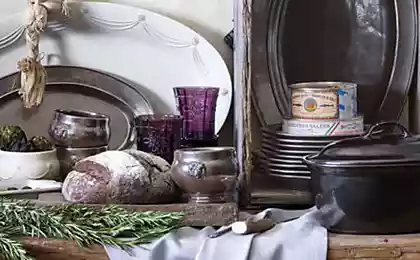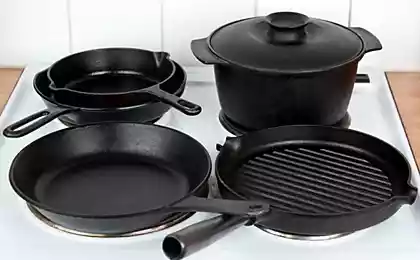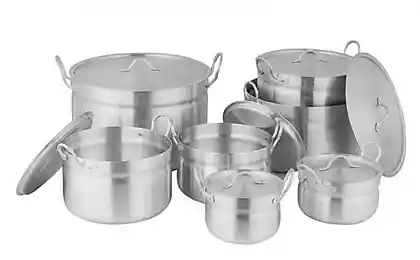198
Washed away all the dishes from her mother-in-law, wanted to help the second mother, and after 2 days she learned that she and her husband had a terrible quarrel.
Why not wash dishes at a party and what mistakes in this everyday business should be avoided in your kitchen? We talk about factors affecting the purity of dishes that we do not always take into account.

After a friendly feast, it is considered a good tone to offer the hostess help with washing dishes. The desire of the guests to help is understandable. However, each person can react to it differently. The fact is that from time immemorial everything associated with cooking was carefully guarded from the evil eye. Many still believe that dishes can accumulate a certain energy. And imbibed her unkind messages of other people can deprive the family of consent and prosperity.

Echoes of this are easy to find in folk signs. For example, it is believed that if a friend often washes dishes in the kitchen of a married woman, then she subconsciously seeks to steal her husband. And if this happens in the kitchen of a free girl, then the marriage of the latter shines very soon.

Therefore, when you are going to take up washing dishes at a party, think carefully. What if the hosts are superstitious and you're embarrassing them? In any case, it is worth asking the owners if they are not against help. And if they are allowed, then you can safely take on the sponge and brush.
Frequent mistakes when washing dishes
On an ordinary kitchen sponge at the same time can be up to 20 types of dangerous microorganisms, including salmonella, E. coli and others. To prevent them from moving to the dishes, change the sponge at least once a week. Experts also advise to have a separate sponge for each surface, regularly dry them, ventilate and pour boiling water.

Do not wipe the plates dry after washing
Many people put dishes in the closet without wiping. This creates an environment for the reproduction of bacteria, leads to the formation of rust, causes the appearance of fungus and increased humidity inside the kitchen furniture.

Do not sterilize kitchen appliances
We remind you that boiling water will not sterilize your spoons. To guarantee the destruction of all bacteria, they must be placed for 3 minutes in water with a temperature of 100 degrees or 10 minutes in water heated to 80 degrees.
“Show me your kitchen and I’ll tell you who you are.” But if men often come to it, just to eat, the hostess spend a lot of time near the stove. And a dirty kitchen in the eyes of guests is what makes a woman dirty. We talk about the signs that are not always noticeable to the owners of the apartment, but clearly hint at the fact that the kitchen would not hurt the general cleaning for a long time.

After a friendly feast, it is considered a good tone to offer the hostess help with washing dishes. The desire of the guests to help is understandable. However, each person can react to it differently. The fact is that from time immemorial everything associated with cooking was carefully guarded from the evil eye. Many still believe that dishes can accumulate a certain energy. And imbibed her unkind messages of other people can deprive the family of consent and prosperity.

Echoes of this are easy to find in folk signs. For example, it is believed that if a friend often washes dishes in the kitchen of a married woman, then she subconsciously seeks to steal her husband. And if this happens in the kitchen of a free girl, then the marriage of the latter shines very soon.

Therefore, when you are going to take up washing dishes at a party, think carefully. What if the hosts are superstitious and you're embarrassing them? In any case, it is worth asking the owners if they are not against help. And if they are allowed, then you can safely take on the sponge and brush.
Frequent mistakes when washing dishes
- Put off washing dishes until tomorrow
Up to 70% of men and women admit that washing dishes is their most hated duty. Different people find different reasons to postpone this activity, but everyone has one serious reason to think. The fact that getting into a fat-rich environment, the bacteria 2-3 hours adapt, and then comes a period of rapid reproduction. So it's in your best interest to wash the dishes quickly so that E. coli doesn't get a chance.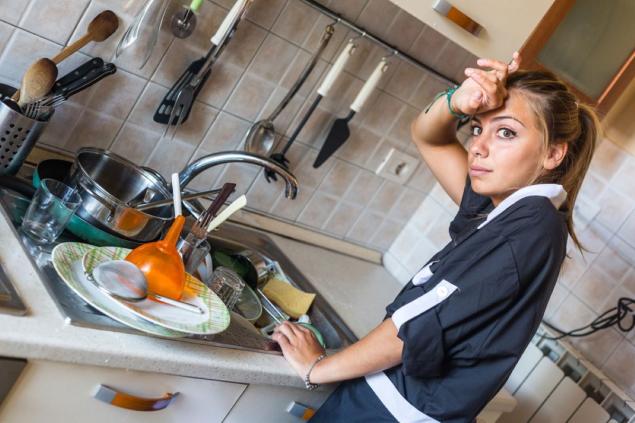
- Putting dirty plates into one another
Many people like to put used plates into each other. But this leads to the fact that they are covered with fat and food residues both inside and outside. And hence the additional cost of time and effort for washing.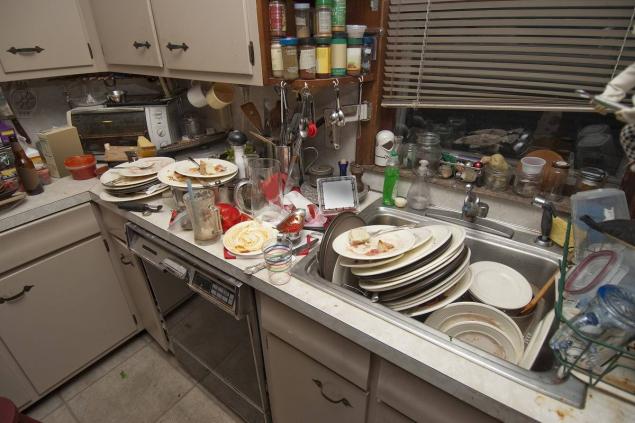
It will be more rational after eating to separate fatty dishes from relatively dry ones. First, it is better to wash dishes from under raw meat and the most fatty plates, and then proceed to less dirty utensils. If there is a lot of fat on the dishes, then before washing it you can wipe it dry with paper towels, and then rinse with warm water.
On an ordinary kitchen sponge at the same time can be up to 20 types of dangerous microorganisms, including salmonella, E. coli and others. To prevent them from moving to the dishes, change the sponge at least once a week. Experts also advise to have a separate sponge for each surface, regularly dry them, ventilate and pour boiling water.

Do not wipe the plates dry after washing
Many people put dishes in the closet without wiping. This creates an environment for the reproduction of bacteria, leads to the formation of rust, causes the appearance of fungus and increased humidity inside the kitchen furniture.

Do not sterilize kitchen appliances
We remind you that boiling water will not sterilize your spoons. To guarantee the destruction of all bacteria, they must be placed for 3 minutes in water with a temperature of 100 degrees or 10 minutes in water heated to 80 degrees.
“Show me your kitchen and I’ll tell you who you are.” But if men often come to it, just to eat, the hostess spend a lot of time near the stove. And a dirty kitchen in the eyes of guests is what makes a woman dirty. We talk about the signs that are not always noticeable to the owners of the apartment, but clearly hint at the fact that the kitchen would not hurt the general cleaning for a long time.
I've heard people say a rat might come out of a sewer, but I never thought an uninvited guest would visit my house.
Why cats are gladly allowed into churches and temples, and dogs are politely escorted to the exit


